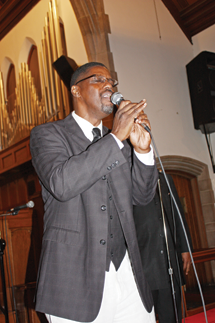
Prison ministry opens doors to empowerment
By Melissa Lauber
UMConnection Staff
 "I was in prison and you visited me."
"I was in prison and you visited me."More than 2,000 years ago Jesus said these words. Today, they’re said by Kevin Petty, who after 39 years of jail time, celebrates his freedom by living his faith.
Petty, who attends Hughes Memorial UMC in Washington, D.C., became addicted to heroin when he was 8-years-old. "It robbed me of my life," he said. "My life became a whirlwind of chasing the next high. I became a prisoner to my addiction."
When he was sentenced by a judge to do time in Lorton Prison in Washington, Petty said he was certain he had forfeited his life. "I would never walk the streets again. That’s what I was resigned to."
Incarcerated, he pursued his passion for R&B music and formed a small band of inmates. One week, the prison chaplain asked Petty to fill in for the regular musicians in worship.
Petty’s "yes," changed his life. "We learned a couple of songs," he said. "It was my first time singing gospel. But I experienced something I never had before. I never left. I never went back. I got a glimpse of God’s redeeming power, that’ we’re all redeemable no matter who you are, no matter how far you fall from grace."
Petty’s conversion happened over time. "I wasn’t really ready," he said. "God decided to reshape and reform me when I was at my worst as a human being and faithfully serving the devil."
Prison ministry volunteers from area churches reached out to him. They were patient. He began to be restored, learning "God is the author of our lives."
"Everything started when I learned there was somebody bigger than me," he said. "I thought I was the author of my life. But God controls all things. He has a path for our lives, all we have to do is choose to walk it."
Petty is grateful to the volunteers for their presence. He worries, now that he’s out, when he sees churches attempting to create formulas for prison ministry. The key, he said, is that every prisoner is different. "Each one has different needs. If you’re called to do this kind of ministry, be patient, loving, nonjudgmental, and be willing to live up to your convictions and wear your heart on your sleeves."
Petty, who was released in August 2009, has recently brought his insights about how to minister to inmates to the Baltimore-Washington Conference.
The conference, explained the Rev. Sonia King of Mount Zion UMC in Pasadena, is in the process of beginning a new effort to reach out to those who are coming home from prison.
She and the Rev. Brian Jackson of Randall Memorial UMC in Washington, co-chair a new conference wide Criminal Justice and Mercy Ministry team.
"The prison population is so high in Maryland. The church needs to do something about that," King said. "The church is called to do something. We need to be forgiving as Christ was on Calvary’s cross. We are called to offer a response."
To begin, the conference’s response will be four regional teams that provide local churches with the resources and training to being "Healing Communities," a program developed by the Annie E. Casey Foundation. It reaches out to individuals and families that are affected by the criminal justice system, which includes those victimized by crime, those arrested, those in jail and those reintegrating.
"We want our churches to become Stations of Hope, where the stigma and shame of the crime is eased and the congregation offers a place of love, forgiveness, redemption and reconciliation," King said.
King used to serve Asbury UMC in Jessup, where the prison was the church’s nearest neighbor. While she went into the prisons, King found her "passion" in helping people be successful when thEy are released.
"People need to realize that 97 percent of those in prison are released into our neighborhoods. How will we treat these people," King asked.
According to state and federal statistics, of those inmates who are released, 67 percent are rearrested and 52 percent are re-incarcerated, said Sandy Ferguson, the conference director of missions. "That kind of recidivism rate should lead the church to ask questions and to take action. United Methodists have a history of ministries of justice. This is a question of restorative justice."
The Healing Communities program is one possible step for our churches, said King. It is a complete program that provides extensive training. "The bottom line, she said, "is being willing to let people know they haven’t been abandoned. We need to be the ones who say, ‘God loves you. God has a plan for you. God wants you to be whole.’ And then we need to help make that a reality for all people. These are our neighbors, these are our brother and sisters. We are called to be our brother’s keepers."
The church has enabled Petty to feel whole. He has a job he’s proud of as an electrician’s trainee. He also sings in the group Amazing Gospel Souls, begun in the Lorton Prison System in 1980.
The group tours and shares their testimony. Petty says he now feels as if he’s living his life story in the way God intended it.
The name of this group’s newest CD is "Free in Him." "We take pains to get the music right," Petty said. "But in the end it’s our lives that are our testimonies. I am free – free in God."
Feature Word:
Liberate
Feature Caption:
Imprisoned for 39 years, Kevin Petty is now sharing freedom’s gifts in a new prison ministry.

Login/Register to leave comment